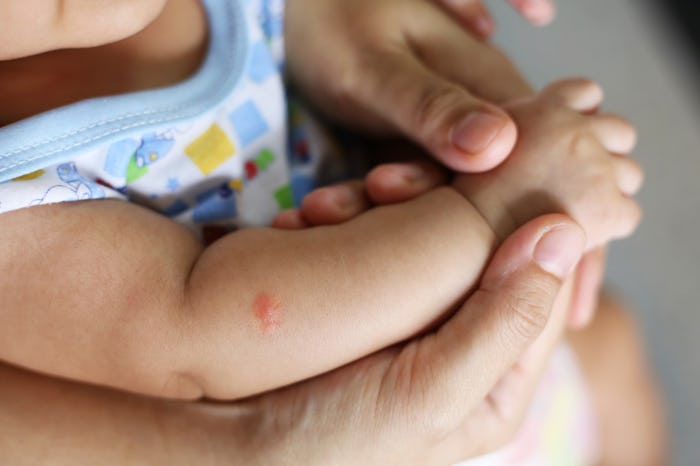Life

If Your Baby Has A Mosquito Bite, Here's What You Need To Know
I am a mosquito magnet. There is just something about me that seems to bring all the biting insects to swarm me like some post-apocalyptic nightmare. You can understand then why I was worried the same thing would happen to my children when I had my first baby. Seriously, if I find the bites so irritating, how on earth would an infant handle it? It turns out, there's a lot to know about mosquito bites on babies, but don't worry, it's not as bad as you're probably thinking.
According to Dr. Geraldine Summa, board-certified pediatrician for the Summit Medical Group, most insect bites aren't a big deal. She commented in a YouTube video that "most of the time, an insect bite or a sting causes temporary discomfort, and most reactions are mild. Some itching or stinging and mild swelling is common." The Mayo Clinic noted that most physicians can identify and diagnose a mosquito bite on-sight, and that the biggest bother from any mosquito bites on babies is from the itching and irritation caused by the inflammatory properties of the nasty little bloodsucker.
Remember, it's only the female mosquitoes that bite, noted the Library of Congress. Their larger, male counterparts actually feed on flower nectar and are generally no problem to us other than the fact that they keep mating the evil, bitey ones.
There are some risks associated with mosquito bites, but the Seattle Children's Hospital noted that these are actually pretty rare. However, if your child is lethargic, if they have a rash that is spreading or streaking from the bite, if they're experiencing a fever or a headache, or if your gut tells you something is wrong, get your child seen. If they're listless or unresponsive, or if your intuition tells you that something has gone seriously awry, Seattle Children's says to dial 9-1-1. Otherwise, speak to your pediatrician, and go from there.
The main concern with mosquito bites in the United States is contracting the West Nile Virus. As per the Centers for Disease Control and Prevention (CDC), most people, even children, will never become symptomatic of the virus even if they contract it. Only about one in 150 people who come in contact with the virus will experience any problems. However, when they do, it can be deadly. Normally it becomes a problem of the brain, causing encephalitis or meningitis. According to the CDC, the "symptoms of severe illness include high fever, headache, neck stiffness, stupor, disorientation, coma, tremors, convulsions, muscle weakness, vision loss, numbness, and paralysis." Generally, the most at-risk population for these problems is people over 60 or those who have had transplants. Surprisingly, as per the CDC, children are no more prone to become ill with West Nile than anyone else.
In the case of mosquitoes on babies, an ounce of prevention is worth a pound of cure. Whether it's a netting to cover your baby's stroller, avoiding the outside at dawn and dusk when the bugs are most active, or using repellant, the key is to not let the nasties land in the first place. Dr Gina DiRenzo-Coffey, a pediatrician at BoysTown Hospital, said in a YouTube video about spray repellant that "we do worry about any chemical that you're going to put on your baby's skin. Number one, they could be irritating to baby's skin, but there's also some absorption that can occur." She stresses that you have to make the right choice of repellant, and not put it on babies under 2 months old. She says to use DEET, spray your hands, and apply it to your baby's head, legs, trunk and feet, but to avoid the face and hands so it doesn't end up in their mouth.
As for relief, The Seattle Children's Hospital recommended that you try to keep your baby from scratching by keeping their nails trimmed short, because open skin breeds infection. You can also apply a cold compress or possibly over-the-counter hydrocortisone cream. Call your pediatrician if you're concerned, but you're more than likely just going to have to deal with a crabby baby who wants to scratch and can't imagine why you'd deny them the pleasure of doing so. Let me tell you, it's no fun, but neither is having to go back to the pediatrician to get antibiotics because they've caused an infection.